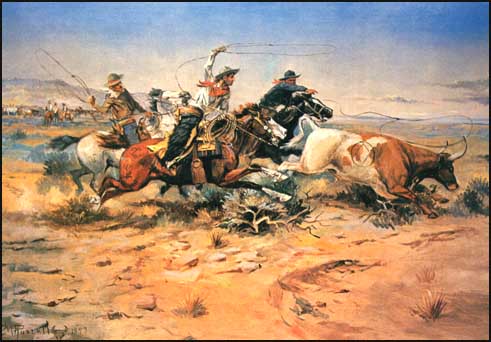Le présent billet a été rédigé par Jonathan Goldberg, que je remercie.
The role of the cowboy in the American West was to herd the cattle on the wide open range -- to prevent them straying and to move them to different grazing areas.
When ranchers began to fence in their cattle in enclosures, the need for cowboys was reduced. For the cowboys this meant the end of their lives on the range and, understandably, they didn’t want to be “fenced in”.
Beginning in the 1920s and continuing to the present day, “Western” movies popularized the rugged outdoor life of cowboys. These films often presented fights between the cowboys and the indigenous, native Americans (called “Indians”), based on crude stereotypes. To this day, the expression “cowboys and Indians” means “the good guys and the bad guys.”
Roy Rogers (1911-1988) was a legendary American singer and actor known as The Singing Cowboy. A song made famous by Roy Rogers in 1944, and later sung by other singers of that era, was Don’t Fence Me In (Laisse-moi ma liberté).
http://www.youtube.com/watch?v=e3ebEEe8VEw
The lyrics of the song expressed that desire not to be closed in.
A humorous French-English version of Don’t Fence Me In, sung by Dean Martin and Mireille Mathieu, may be heard on this video clip:
http://www.youtube.com/watch?v=tmh3v8TPyn4
Linguistic Note:
The word “fence” has different meanings in different contexts. As a noun, its common meaning is a barrier (clôture). It can also refer to a person who trades in stolen goods (receleur). Fencing is a sport (escrime), as well as the material used to make a fence (matériau pour clôture). A fencer is un escrimeur. To fence with a sword or sabre is tirer à l’épée/au sabre. To fence off usually means to separate a piece of land from its surroundings (séparer par une clôture). A sunken fence (saut-de-loup) surrounding a garden with its top at the garden ground level, bounded with a ditch on the outer side, is also known as a ha-ha: http://fr.wikipedia.org/wiki/Ha-ha (1). This keeps off sheep and cattle, without obstructing the view. The origin of that term is French (World Wide Words).
The American Heritage® Dictionary of the English Language, Fourth Edition contains the following definitions:
Fence:
Noun:
1. A structure serving as an enclosure, a barrier, or a boundary, usually made of posts or stakes joined together by boards, wire, or rails.
2. The art or sport of fencing.
3. a. One who receives and sells stolen goods.
b. A place where stolen goods are received and sold.
Transitive verb:
1. To enclose with or as if with a fence.
2. To separate or close off by or as if by means of a fence.
3. To sell (stolen goods) to a fence.
Intransitive verb:
1. To practice the art or sport of fencing.
2. To use tactics similar to the parry and thrust of fencing.
3. To avoid giving direct answers; hedge.
4. To act as a conduit for stolen goods.
Several idioms containing the word fence exist in English:
- To mend fences – rétablir de bonnes relations; se réconcilier (après un désaccord)
- To sit on the fence – ménager la chèvre et le chou
So do some proverbs:
- Good fences make good neighbors (from the 17th century but made famous by Robert Frost’s poem, “Mending Wall”).
- Do not protect yourself by a fence, but rather by your friends (Polish);
- The grass is always greener on the other side of the fence;
- Make not a fence more expensive or more important than the thing that is fenced (Hebrew).
(1) Ha Ha (1712): this 18th-century garden feature consisted of a trench, the inner side perpendicular and faced with stone, the outer sloping and turfed, that was intended to allow the landowner an uninterrupted view of the countryside. It came from the French word haha ‘…a ditch behind an opening in a wall at the bottom of an alley or walk’. According to French etymologists the ha! is an exclamation of surprise – or could it be fear?
http://www.askoxford.com/worldofwords/wordfrom/garden/

How funny - I ran across the word "haha" for the first time in a book last night, and at first it was not explained, then a few pages later it was explained. Never heard of that before (haha!)
RépondreSupprimerJacquie